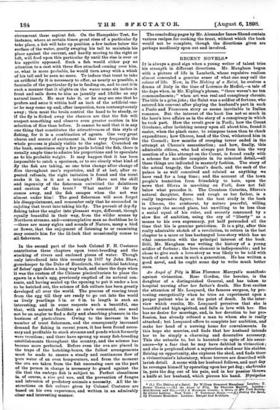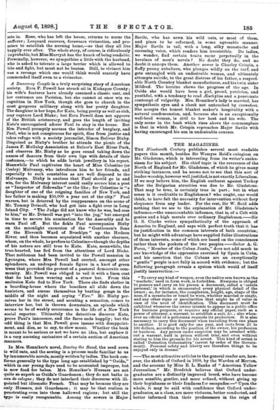RECENT NOVELS"
Jr is always a good sign when a young writer of talent tries his strength in different directions. Mr. Maugham began with a picture of life in Lambeth, whose repulsive realism almost concealed a genuine sense of what one may call the colour of life. Now, in The Making of a Saint, he evolves a drama of Italy in the time of Lorenzo de Medici,—a tale of the days when, in Mr. ICipling's phrase, "there weren't no ten commandments ;" when art was real and conspiracy chronic. The title is a grim joke ; the Saint was a soldier of fortune, who entered his convent after playing the husband's part in such a Paolo and Francesca story as seems inevitable in Italian romance. Bat the interest of the book lies not so much in the hero's love affairs as in the story of a conspiracy in which he took part. How the revolt grew in Forli; how the Count Girolamo, after lavishing money upon all about him, found it easier, when the pinch came, to reimpose taxes than to check expenditure; how Checco, head of the Orsi, withstood him in the Council ; how months of creeping terror ended in the attempt at Checco's assassination ; and how, finally, this admirable citizen, who had always put from him the very mention of a like attempt on the Count, is found ready with a scheme for murder complete in its minutest detail,—all these things are indicated in masterly fashion. The story of the actual tragedy, the Count's death, and the sack of the palace is as well conceived and related as anything we have read for a long time ; and the account of the town people's transition from friendship to hate, upon the news that Sforza is marching on Forli, does not fall below what precedes it. The Countess Caterina, Sforza's natural daughter, fierce and rough as her father, is a really impressive figure ; but the best study in the book is Checco, the aristocrat, by nature peaceful, willing to accept the second place, but unwilling to be less than a social equal of his ruler, and secretly consumed by a slow fire of ambition, using the cry of " liberty " as a means to his own supremacy, yet half persuaded all the time that his is genuine patriotism. It is a pity, after this really admirable sketch of a revolution, to return in the last chapter to a more or less hackneyed love-story which has no vital connection with the principal interest of the book. Still, Mr. Maugham was writing the history of a young soldier of fortune; the love element is indispensable; and he chose to give such a love-story as was likely to be told with truth of such a man in such a generation. He has written a good novel, and he ought some day to write much better ones.
An Angel of Pity is Miss Florence Marryat's manifesto against vivisection. Rose Gordon, the heroine, is the daughter of a distinguished General, and has taken to hospital nursing after her father's death. She first excites the attention of Mr. Lesquard, the famous surgeon, by pro- testing energetically when he tries an experiment upon a pauper patient who is at the point of death. In the inter- view which results, Mr. Lesquard perceives that she is beautiful and high-spirited, and falls in love with her. She has no desire for marriage, and, in her devotion to her pro- fession, has already refused a man to whom she is really attached ; bat Lesquard offers to complete her ambition, and make her head of a nursing home for convalescents. In this hope she marries, and finds that her husband intends her to be simply a charming and decorative accessory. This she submits to, but is haunted—in spite of his assur- ances—by a fear that he may have dabbled in vivisection ; and she is perplexed about a mysterious shed near his stables. Seizing an opportunity, she explores the shed, and finds there a vivisectionist's laboratory, whose horrors are described with lavish detail. A scene with her husband follows, and nest day he revenges himself by operating upon her pet dog; she breaks in, puts the dog out of his pain, and in her passion throws a knife at her husband, which pierces his hand. BIsiPelaa • (1.) The Making of a Saint. By Wdlism Somerset Mang Fisher Unwin.—t2.) An Angel of Pity. By Florence Hutchinson and Co.—(3.) A linnawan Couple: a Story of By Oliver Lowrey. New York : F. Tennyhoo Neely.—i44 By Florence Henniker. Londoa: Harper and Brothers. ' London: T. at. London : York Society. owing the Sand. seta in. Rose, who has left the house, returns to nurse the sufferer ; Lesquard recovers, forswears vivisection, and pro- mises to establish the nursing home,—so that they all live happily ever after. The whole story, of course, is ridiculously improbable, but Miss Marryat has the knack of being readable. Personally, however, we sympathise a little with the husband, who is asked to tolerate a large terrier which is allowed to bite and fight, but must not be beaten. Still, to vivisect him was a revenge which one would think would scarcely have commended itself even to a vivisector.
A Runaway Couple is a truly surprising story of American society. Ezra F. Powell has struck oil in Kickapoo County ; his wife's features have already assumed a classic cast, and her costumes are Parisian, but she cannot at once win re- cognition in New York, though she goes to church in the most gorgeous millinery along with her pretty daughter. The daughter is her hope, for Kate, being pretty as well as rich, may capture Lord Blake; but Ezra Powell does not approve of the British aristocracy, and goes the length of inviting Kate's unrecognised adorer Paul to stay in the house. But Mrs. Powell promptly accuses the intruder of burglary, and Pan], who is not conspicuous for spirit, flies from justice and takes refuge with a society journalist, Simon Bolivar Bixby. Disguised as Bixby's brother he attends the picnic of the James F. Mullaley Association at Sulzer's East River Park, and observes Mr. Bixby as he goes round taking down the names of dancers from their own lips with details of their costumes,—to which he adds lavish jewellery in his report. Meanwhile Paul captivates the heart of Miss Celestine (or Ceeley) Mulvaney, who introduces him to her friends, and especially to such constables as are well disposed to the Mulvaneys. Bixby is anxious that Paul should go in and win, for the Mulvaney interest could easily secure him a post as "Inspector of Sidewalks" or the like ; for Celestine is "a daughter of one of the reigning families of New York, and her father is making $50,000 a year out of the city?? Paul wavers, but is deterred by the reappearance on the scene of Mr. Tommy Driscoll, who had got into a fight over in Long Island City. "The Judge did not know who he was, bad cess to him," so Mr. Driscoll was put "into the jug," but emerged in time to secure his nomination for the Assembly and to warn Paul off. But the fickle Paul accompanies Bixby on the moonlight excursion of the "Gentlemen's Sons of the Eleventh Ward of Brooklyn" up the Hudson River, and thus becomes acquainted with another charmer, whom, on the whole, he prefers to Celestine—though the depths of his nature are still true to Kate. Kate, meanwhile, the true-hearted, has fled from the attentions of Lord Blake. That nobleman had been invited to the Powell mansion in Lyeurgus, where Mrs. Powell had erected, amongst other splendours, an undraped female figure in a knot of green trees that provoked the protest of a pastoral democratic com- munity. Mr. Powell was obliged to veil it with a linen coat that he had been wearing and a straw hat. From this seclusion Kate fled to New York. There she finds shelter in a boarding-house where the boarders all elide down the banisters, and amuse themselves by beating gongs in the middle of the night and crying "Fire." Mr. Bixby per- ceives her in the street, and scenting a sensation, comes to interview her, but is thrown downstairs, an episode which seems to be of weekly occurrence in the life of a New York social reporter. Ultimately the detectives discover Kate, prove Paul's innocence, and the farce ends happily ; but the odd thing is that Mrs. Powell goes insane with disappoint- ment, and dies, so to say, to slow music. Whether the book is meant to be serious or not we have no idea, but anyhow it is a very amusing caricature of a certain section of American manners.
In Mrs. Henniker's novel, Sowing the Sand, the seed sown is wild oats, and the sowing is a process made familiar to us by innumerable novels, mostly written by ladies. The book con- forms generally to the type long ago established by " Ouida," which in our young days used to be accounted improper, but is now food for babes. Mrs. Henniker's Hussars are not quite so superb as Onida's Guardsmen ; they do not bathe in eau de cologne ; they do not interlard their discourse with ill.. pointed but idiomatic French. That may be because they are only Hussars, not Guardsmen ; it may be that realism is penetrating even into these hallowed regions; but still the tape is easily recognisable. Among the sowers is Major Savile, who has sown his wild oats, or most of them, and pines to be reformed, in some agreeable manner. Major Savile is tall, with a long, silky moustache and caressing voice, which renders him irresistible. Do ladies, we wonder, find certain traits recur perpetually in the heroines of men's novels ? No doubt they do, and no doubt it annoys them. Another sower is Charley Crispin, a fluffy young subaltern, who plunges wildly on the turf, and gets entangled with an undesirable woman, and ultimately attempts suicide, to the great distress of his father, a respect- able North Country blanket manufacturer, and his twin sister Mildred. The heroine shows the progress of the age. In Ouida she would have been a girl, proud, patrician, and youthful, with a tendency to read Aschylus and a passionate contempt of vulgarity. Mrs. Henniker's lady is married, has sympathetic eyes and a cheek not untouched by crowsfeet. She accepts the honest blanket maker's hospitality with a natural condescension, and, because she is an exceptionally well-bred woman, is civil to her host and his wife. The only scene in the book which rises above the commonplace is that in which Mr. Crispin reproaches Major Savile with having encouraged his son in undesirable courses.



































 Previous page
Previous page